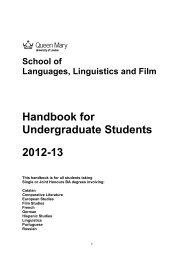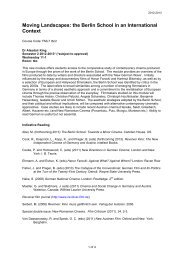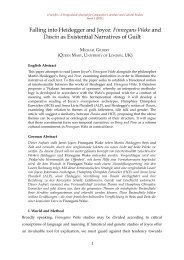Create successful ePaper yourself
Turn your PDF publications into a flip-book with our unique Google optimized e-Paper software.
eTransfers. A Postgraduate eJournal for Comparative Literature and Cultural Studies<br />
Issue 1 (2011)<br />
-generierung in einem alltäglichen Zusammenhang repräsentiert, argumentiert der Aufsatz<br />
auch, dass erzählende Fiktion zumindest das Potential hat, kognitive Prozesse in ihrem<br />
natürlichen Kontext greifbar zu machen, wobei ein breiterer Kognitionsbegriff verwendet<br />
wird als die enggefasste psychologische Definition.<br />
I. Introduction<br />
Just to the left of the midline, running laterally away out of sight under the bone, is<br />
the motor strip. Behind it, running parallel, is the sensory strip. So easy to damage,<br />
with such terrible, lifelong consequences. How much time has he spent making<br />
routes to avoid these areas, like bad neighbourhoods in an American city. And this<br />
familiarity numbs him daily to the extent of his ignorance, and of the general ignorance.<br />
For all the recent advances, it’s still not known how this well-protected one<br />
kilogram or so of cells actually encodes information, how it holds experiences,<br />
memories, dreams and intentions. 1<br />
This quotation shows Henry Perowne, the protagonist of Ian McEwan’s 2005 novel<br />
<strong>Saturday</strong>, musing about the current state of knowledge about human cognition.<br />
Perowne is a successful neurosurgeon at a London hospital. The sequence from<br />
which this quotation is taken is one of the many passages in the novel in which the<br />
narrating instance makes the reader privy to Perowne’s musings, to the seemingly<br />
idle activity of the surgeon’s mind in undirected thought. The musings quoted in the<br />
epigraph occur after Perowne has performed an emergency surgery on Baxter, a man<br />
whom he has already met earlier in the day. In the morning Baxter and two of his<br />
friends were involved in a minor car accident with Perowne, which was followed by<br />
an almost violent confrontation in the street. In the evening Baxter and one of his ac-<br />
complices break into the Perowne’s family home and threaten to rape their pregnant<br />
daughter in front of a family gathering. In both instances escape is narrow and in<br />
great parts due to Perowne’s medical knowledge. After the second confrontation<br />
with Baxter, Perowne and his son Theo manage to throw Baxter down a staircase,<br />
with the resulting injury making the nocturnal emergency surgery necessary. After<br />
the operation, waiting to close Baxter’s skull, Perowne’s wandering thoughts touch<br />
upon a crucial systematic problem of cognitive science, namely the connection<br />
between brain and mind, which also poses a problem for brain surgery. After all,<br />
brain surgery is directed at the brain in order to cure problems of the mind. There<br />
might be a certain amount of relatively secure knowledge about the brain which<br />
1 Ian McEwan, <strong>Saturday</strong>. (London: Vintage, 2006 [2005]), 254. For further quotations, <strong>Saturday</strong> will be<br />
abbreviated as S.<br />
2







